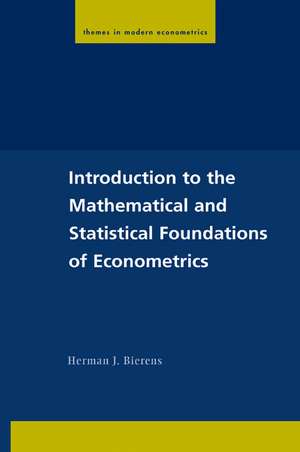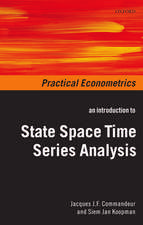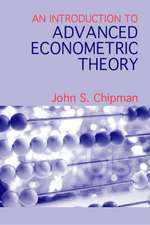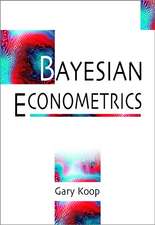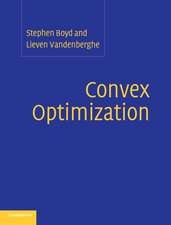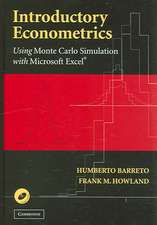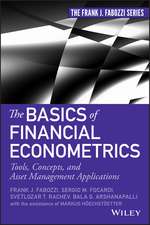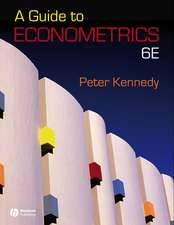Introduction to the Mathematical and Statistical Foundations of Econometrics: Themes in Modern Econometrics
Autor Herman J. Bierensen Limba Engleză Paperback – 19 dec 2004
| Toate formatele și edițiile | Preț | Express |
|---|---|---|
| Paperback (1) | 452.26 lei 43-57 zile | |
| Cambridge University Press – 19 dec 2004 | 452.26 lei 43-57 zile | |
| Hardback (1) | 565.16 lei 43-57 zile | |
| Cambridge University Press – 19 dec 2004 | 565.16 lei 43-57 zile |
Din seria Themes in Modern Econometrics
- 8%
 Preț: 430.50 lei
Preț: 430.50 lei - 14%
 Preț: 1091.50 lei
Preț: 1091.50 lei -
 Preț: 351.11 lei
Preț: 351.11 lei -
 Preț: 372.21 lei
Preț: 372.21 lei -
 Preț: 383.48 lei
Preț: 383.48 lei -
 Preț: 349.80 lei
Preț: 349.80 lei -
 Preț: 288.37 lei
Preț: 288.37 lei -
 Preț: 434.64 lei
Preț: 434.64 lei -
 Preț: 434.12 lei
Preț: 434.12 lei -
 Preț: 421.95 lei
Preț: 421.95 lei - 14%
 Preț: 1012.27 lei
Preț: 1012.27 lei -
 Preț: 348.02 lei
Preț: 348.02 lei - 11%
 Preț: 646.47 lei
Preț: 646.47 lei -
 Preț: 263.32 lei
Preț: 263.32 lei - 14%
 Preț: 697.80 lei
Preț: 697.80 lei - 11%
 Preț: 447.69 lei
Preț: 447.69 lei -
 Preț: 319.61 lei
Preț: 319.61 lei
Preț: 452.26 lei
Nou
Puncte Express: 678
Preț estimativ în valută:
86.54€ • 90.58$ • 72.03£
86.54€ • 90.58$ • 72.03£
Carte tipărită la comandă
Livrare economică 31 martie-14 aprilie
Preluare comenzi: 021 569.72.76
Specificații
ISBN-13: 9780521542241
ISBN-10: 0521542243
Pagini: 344
Ilustrații: 19 b/w illus. 12 tables
Dimensiuni: 152 x 229 x 20 mm
Greutate: 0.49 kg
Ediția:New.
Editura: Cambridge University Press
Colecția Cambridge University Press
Seria Themes in Modern Econometrics
Locul publicării:New York, United States
ISBN-10: 0521542243
Pagini: 344
Ilustrații: 19 b/w illus. 12 tables
Dimensiuni: 152 x 229 x 20 mm
Greutate: 0.49 kg
Ediția:New.
Editura: Cambridge University Press
Colecția Cambridge University Press
Seria Themes in Modern Econometrics
Locul publicării:New York, United States
Cuprins
Part I. Probability and Measure: 1. The Texas lotto; 2. Quality control; 3. Why do we need sigma-algebras of events?; 4. Properties of algebras and sigma-algebras; 5. Properties of probability measures; 6. The uniform probability measures; 7. Lebesque measure and Lebesque integral; 8. Random variables and their distributions; 9. Density functions; 10. Conditional probability, Bayes's rule, and independence; 11. Exercises: A. Common structure of the proofs of Theorems 6 and 10, B. Extension of an outer measure to a probability measure; Part II. Borel Measurability, Integration and Mathematical Expectations: 12. Introduction; 13. Borel measurability; 14. Integral of Borel measurable functions with respect to a probability measure; 15. General measurability and integrals of random variables with respect to probability measures; 16. Mathematical expectation; 17. Some useful inequalities involving mathematical expectations; 18. Expectations of products of independent random variables; 19. Moment generating functions and characteristic functions; 20. Exercises: A. Uniqueness of characteristic functions; Part III. Conditional Expectations: 21. Introduction; 22. Properties of conditional expectations; 23. Conditional probability measures and conditional independence; 24. Conditioning on increasing sigma-algebras; 25. Conditional expectations as the best forecast schemes; 26. Exercises; A. Proof of theorem 22; Part IV. Distributions and Transformations: 27. Discrete distributions; 28. Transformations of discrete random vectors; 29. Transformations of absolutely continuous random variables; 30. Transformations of absolutely continuous random vectors; 31. The normal distribution; 32. Distributions related to the normal distribution; 33. The uniform distribution and its relation to the standard normal distribution; 34. The gamma distribution; 35. Exercises: A. Tedious derivations; B. Proof of theorem 29; Part V. The Multivariate Normal Distribution and its Application to Statistical Inference: 36. Expectation and variance of random vectors; 37. The multivariate normal distribution; 38. Conditional distributions of multivariate normal random variables; 39. Independence of linear and quadratic transformations of multivariate normal random variables; 40. Distribution of quadratic forms of multivariate normal random variables; 41. Applications to statistical inference under normality; 42. Applications to regression analysis; 43. Exercises; A. Proof of theorem 43; Part VI. Modes of Convergence: 44. Introduction; 45. Convergence in probability and the weak law of large numbers; 46. Almost sure convergence, and the strong law of large numbers; 47. The uniform law of large numbers and its applications; 48. Convergence in distribution; 49. Convergence of characteristic functions; 50. The central limit theorem; 51. Stochastic boundedness, tightness, and the Op and op-notations; 52. Asymptotic normality of M-estimators; 53. Hypotheses testing; 54. Exercises: A. Proof of the uniform weak law of large numbers; B. Almost sure convergence and strong laws of large numbers; C. Convergence of characteristic functions and distributions; Part VII. Dependent Laws of Large Numbers and Central Limit Theorems: 55. Stationary and the world decomposition; 56. Weak laws of large numbers for stationary processes; 57. Mixing conditions; 58. Uniform weak laws of large numbers; 59. Dependent central limit theorems; 60. Exercises: A. Hilbert spaces; Part VIII. Maximum Likelihood Theory; 61. Introduction; 62. Likelihood functions; 63. Examples; 64. Asymptotic properties if ML estimators; 65. Testing parameter restrictions; 66. Exercises.
Recenzii
'The objective of this book is to use it as an introductory text for a Ph.D. level course in Econometrics. … Appendixes are self contained with review which are easy to learn and understand. As a whole, I consider this book as unique and self-contained and it will be a great resource for researchers in the area of Econometrics.' Zentralblatt MATH
Notă biografică
Descriere
This book is intended for use in a rigorous introductory PhD level course in econometrics.
